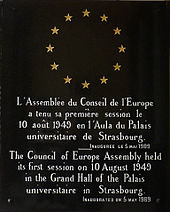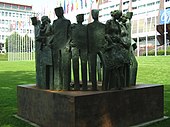Council of Europe
![]()
This article is about the Council of Europe (CoE / CdE). This is not to be confused with the EU institutions European Council or Council of the European Union (also called EU Council of Ministers).
The Council of Europe (CoE) is a European international organisation established on 5 May 1949 by The Statute of the Council of Europe, a treaty signed in London. Today, the Council of Europe has 47 member states with 820 million citizens.
The Council of Europe is a forum for debate on general European issues. Its Statute provides for general cooperation between member states to promote economic and social progress.
"The Council of Europe has the task of realising a closer union among its members."
- Statute of the Council of Europe, Article 1
The seat of the Council of Europe is the Palace of Europe in Strasbourg, France. The founding day of the Council of Europe is celebrated every year on 5 May as Europe Day.
The Council of Europe is not institutionally linked to the European Union (EU), even though both use the European flag and the European anthem. The Council of Europe's central responsibility is the protection of human rights, while the EU's focus is on economic cooperation. The Council of Europe is also not to be confused with the EU institutions European Council (body of heads of state and government) and Council of the European Union (Council of Ministers).
The EU and the Council of Europe signed a Memorandum of Understanding (MoU) in May 2007 as a political declaration of intent.
History
The Council of Europe was founded by ten northern and western European states. It received its formal statute on 5 May 1949 from Belgium, Denmark, France, Ireland, Italy, Luxembourg, the Netherlands, Norway, Sweden and the United Kingdom in the London Ten-Power Pact. It is thus the oldest original political organisation of European states. It was founded by the European Conference on Federation at the instigation of the American Committee for a United Europe.
In addition to the economic OEEC (merged into the OECD) and military cooperation within the framework of NATO, the political unification of the continent took concrete shape with the Council of Europe.
The Federal Republic of Germany joined the body on 14 July 1950, initially as an associate member, and became a full member in May 1951. The Saarland (an autonomous state until 1 January 1957) was already an associate member on 13 May 1950 and a full member from 2 May 1951. Austria attained membership in 1956, and Switzerland in 1963.
All but three European states now belong to the Council of Europe. As such, the Vatican City State does not enter into relations with other states, but leaves its representation at the international level to the Holy See - the latter, as a non-state subject of international law, has observer status in the Committee of Ministers. Belarus has been a candidate country since 1993. Kosovo will only be considered for membership once its status has been clarified under international law. Until then, Kosovo has been granted observer status since April 2013 through two representatives of the Kosovar parliament, who can participate in the debates of the plenary sessions and in the work of the committees without voting rights.
Following the controversial vote on Crimea's affiliation to Russia, the Council of Europe provisionally withdrew the voting rights of the 18 Russian deputies in April 2014 by a majority of 145 votes to 21 with 22 abstentions. In addition, Russia is excluded from the governing bodies of the Assembly until further notice, whereupon the Russian deputies boycotted the meetings of the Assembly from then on and Russia also stopped paying its membership fees from June 2017 until further notice.
Because the withdrawal of voting rights was not regulated in the Council of Europe's statutes, and because after two years without paying dues Russia was threatened with permanent expulsion and an election of the organization's next secretary-general without Russian members in the Parliamentary Assembly, the Council of Ministers decided on 17 May 2019, on the initiative of the Finnish presidency, to introduce a new multi-stage procedure for sanctioning members to pave the way for Russia's renewed full membership.

Plaque in the assembly hall of the main building of the University of Strasbourg commemorating the first meeting of the Council of Europe in 1949
Objective
The Council of Europe is a forum for debate on general European issues. Within its framework, intergovernmental agreements binding under international law (Council of Europe conventions, such as the European Convention on Human Rights) are concluded with the aim of preserving the common heritage and promoting economic and social progress.
Since 1993, the Council of Europe has been devoting increased attention to safeguarding democratic security. This includes in particular:
- the commitment to human rights
- the safeguarding of democratic principles, and
- basic constitutional principles
- Combating terrorism with the Council of Europe's Committee of Experts on Combating Terrorism
- Promoting economic and social progress
- Promoting cultural cooperation (e.g. by establishing the legal framework for the recognition of higher education studies and diplomas, the legal protection of cultural minorities and the creation of policy guidelines for intercultural dialogue) - an area in which the EU has no competence of its own and should therefore cooperate with the Council of Europe in accordance with Articles 165 (3) and 167 (3) of the TFEU (Treaty on the Functioning of the European Union).
- Promoting environmental protection and nature conservation in Europe, including the implementation of the European Year of Nature Conservation.

Monument for human rights in front of the Europapalast
Questions and Answers
Q: What is the Council of Europe?
A: The Council of Europe is an international organization made up of 47 member states in the European region.
Q: What was one of the Council of Europe's early successes?
A: One of the Council of Europe's early successes was the creation of the European Convention on Human Rights in 1950, which serves as the basis for the European Court of Human Rights.
Q: Where is the Council of Europe based?
A: The Council of Europe is based in Strasbourg on the Franco-German border. The original meeting place was in the city's University Palace, but it has now been replaced by the Palais de l'Europe, which is about two kilometres from the city centre.
Q: Who can become a member of the Council of Europe?
A: Any European democracy which accepts the principle of the rule of law and guarantees fundamental human rights, civil rights and freedoms to its citizens and respects the rights of minority groups can become a member of the Council of Europe.
Q: Is the Council of Europe part of the European Union?
A: No, the Council of Europe is a separate organisation and not part of the European Union. However, all member states of the European Union are also member states of the Council of Europe.
Q: Why was Russia excluded from the Council of Europe in 2022?
A: Russia was excluded from the Council of Europe in 2022 because of the 2022 Russian invasion of Ukraine.
Q: How many member states make up the Council of Europe?
A: The Council of Europe is made up of 47 member states in the European region.
Search within the encyclopedia